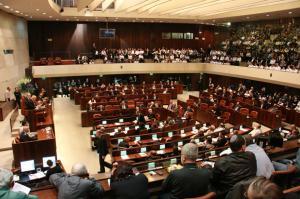Fine-tune the electoral system
Since the electorate cannot and should not be told how to vote, all that the electoral system can do is provide incentives for those voters who might prefer to vote for the large parties. It is those changes in the system that provide such incentives that should be carefully considered.
One such change is raising the threshold for attaining representation in the Knesset. The present two percent threshold makes it likely that the smallest faction represented in the Knesset will have at least three MKs, although Kadima did manage to squeeze into the Knesset in the last elections with two MKs.
Raising the threshold is likely to reduce the number of small parties represented in the Knesset and thus also increase the strength of the large parties. Since the resulting effects of such changes cannot be predicted with certainty it is best to act with caution, and proceed gradually. A change to two and a half percent could be considered.
Nothing will have been accomplished if artificial blocs of small parties will be formed with the aim of overcoming the new threshold, with the intention of splitting again after the elections. The fragmentation of Knesset factions is a well known phenomenon in Israel. It is far from hygienic and is, in effect, a betrayal of the voters who voted for the slate as it presented itself during the election. Raising the threshold should therefore be accompanied by a law that would prohibit such fragmentation. A party should function in the Knesset in the form that it presented itself to the voter at election time. MKs who change their minds during the Knesset’s tenure, or decide to leave the party on whose ticket they appeared for the elections, should be forced to resign from the Knesset and let the next candidate on the slate take his or her place.
A law providing that the head of the largest faction elected to the Knesset be the first to be asked to form a coalition might also channel votes to the larger parties. Should he not succeed, the president could then ask others to attempt to form a coalition. Here too, this law needs to be accompanied by a law against fragmentation of factions after the elections, in order to forestall the manipulative creation of electoral blocs prior to the elections. All these changes should require more than a simple majority for passage.
Moshe Arens

